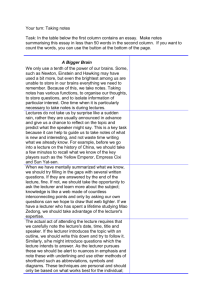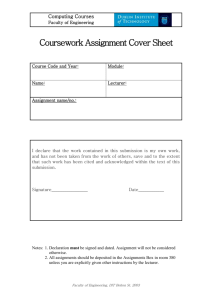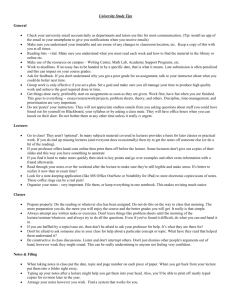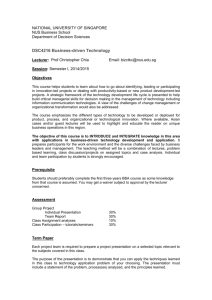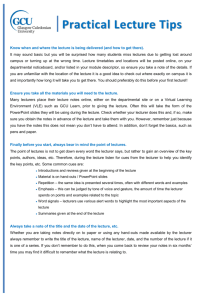Studying Computing at the UU
advertisement
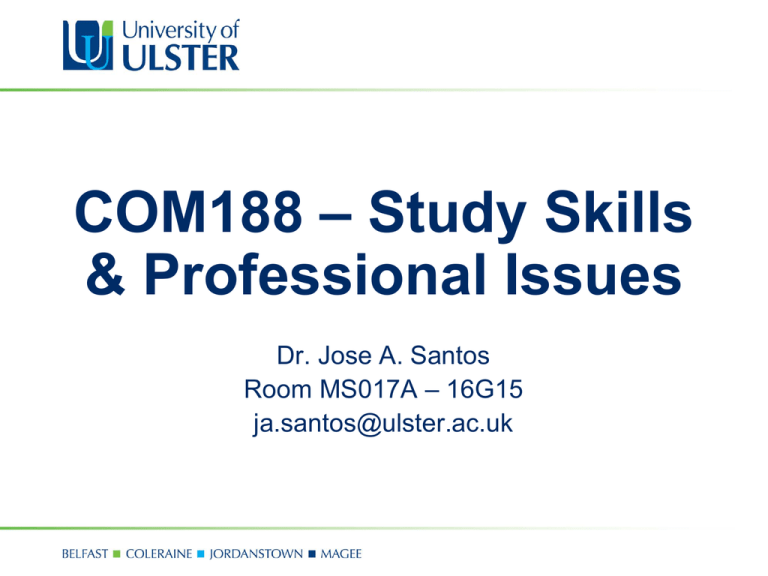
COM188 – Study Skills & Professional Issues Dr. Jose A. Santos Room MS017A – 16G15 ja.santos@ulster.ac.uk The Course The Course Website http://scm.ulster.ac.uk/~e62901/CD/cs.htm Important Course Information Mode of Study and Drop In Centre The Hours-Effort and the Credit Structure The Main Regulations Document/Support Area Marks & Assessment (CW & Exams) COM188 Module Specification The Module WebSite http://scisweb.ulster.ac.uk/~jose/COM188/ http://scm.ulster.ac.uk/~e10136464/ Module Specification http://www.scis.ulster.ac.uk/~jose/COM188/files/CO M188-StudySkillsProfIss.pdf http://scm.ulster.ac.uk/~e62901/CD/ModulesCS141 013.pdf The Module Handout The Module Contents Study Skills (Week 1) Referencing and Plagiarism (Week 2) Oral Presentations (Weeks 3-7, 9 & 10) CV Construction & Personal Portfolio (Week 10 - L) Examination Preparation Skills (Week 11) CV Construction & Personal Portfolio 2 (Week 12L) Assessment CW1: Oral Presentations – 40% The students will be required to divide into groups and each group will be tasked with the preparation of an oral presentation on one of the topics covered in the module The module website contains a list of the subtopics that should be covered as a minimum as part of the presentation; each group should take this list and develop a comprehensive presentation of the topic using the literature available and deliver an oral presentation on the topic selected during the appropriate week. Each presentation will last for 1 hour. Each member of the group should take part in the oral presentations and each group should also present a case study on the topic for discussion in class. This discussion will be lead by the group. Assessment Topics to be Prepared: Ethics and Professional Codes of Conduct (G1 – Wk3) Digital Entertainment (G2 – Wk4) Sex & Technology (G3 – Wk4) Governance of the Internet (G4 – Wk5) Regulation and Control of Personal Information (G5 – Wk6) Computer Misuse, Online Crime and the Criminal Law (G6 – Wk7) Intellectual Property Rights & Unwanted Electronic Attention (G7 – Wk9) Technology & the Human Body (G8 – Wk10) Oral Presentations Marking Scheme The following criteria will be used: Quality and Completeness of the Presented Material – 40% (to include Peer Marking Contribution 10%) Level of Preparation and Confidence of Each Group Member 30% (this is an individual mark based on the quality of the delivery) Overall Quality of the Presentation Delivery – 10% (to include Peer-Marking Contribution 10%) Presentation of Case Study and Group Led Discussion – 20 % (to include Peer-Marking Contribution 5%) The marking of this assignment includes and element of peermarking, each group will be given a marking sheet that they will use to assess their peers. This peer assessment will contribute to the overall quality of the “Presentation Delivery”, the “material presented” and the “group led discussion” (25% of the total mark). Assessment CW2 – Class Test – 30% (Wednesday Week 8) This assignment consists of a 2 hour closed book (MultipleChoice/Completion) examination. This assignment will consist of a 2 hour, closed book, Black-Board examination, the questions will be taken from the topics covered in weeks 2 to 7 (in the oral presentations and complementary material). This test will take place on week 8 of the semester. Referencing (Week 2) Ethics in the Computing Profession Digital Entertainment and Censorship Regulation and Control of Personal Information Computer Misuse – Online Crime and Criminal Law Intellectual Property Rights (Week 7) Assessment CW3 – Personal Portfolio – 30% The student should produce a personal portfolio containing his/her: CV and covering letter and a fully completed Standard Application Form. This portfolio should be well presented, it should include relevance of content to a competitive graduate market, matching of content to vacancy information, description of own skills in a positive and relevant manner. Submission deadline for personal portfolio is week 12 of the semester Also overall impact from a reader’s perspective will be assessed. Personal Portfolio Marking Criteria • • • Cover Letter CV SAF 20% 40% 40% Each element of the work will be assessed according to the following criteria: Presentation /Style How well presented the assignments are, following the guidelines given during the appropriate workshops. This would include neatness, choice of paper, handwriting/word processing, layout and overall visual impact. It would also include correct and appropriate use of English (spelling, vocabulary, punctuation, grammar etc), originality and creative use of space. Content How well the content matches the requirements of the user. This would include relevance of content to a competitive graduate market, matching content to vacancy information, describing own skills in a positive and relevant manner. Overall Impact This will be based on the likely reader’s perspective. How would a potential graduate employer or a tutor for a postgraduate course view the document? What is the overall impression? Is it likely to result in an invitation to interview? Studying at UU - Study Skills The First Shock – University Culture University is not like School There is Less Supervision There are more Expectations Regarding “Independent Study” Decisions are no longer made for you – there is more independence and responsibility for your own progress The First Shock – University Culture One of the major differences between school and university relates to the work you will do: Time Management Whatever else you may experience over the time you are studying, one thing is certain: YOU ARE GOING TO BE BUSY Time management is without doubt one of the key factors governing success in studying Managing your time effectively will allows you to be more productive, doing more as well as being able to concentrate on the priority tasks and get better results. Time Management – The Problem The main problem in managing your time is the conflict of priorities that will arise once you start your course; some tips: Early on, have time taken up with settling in, finding accommodation and simply getting used to a new way of life and all it entails; You may need to do some paid work alongside your course, either to keep you solvent or to extend your spending power. Time Management – The Problem You may have major subsidiary activities and objectives that take time alongside studying; these could range from athletics to theatre. You may have to commute and take up time ‘on the road’ as it were, if you do not live on campus or nearby. Beyond all this you will have other interests and friends all demanding some time if you are to get the best out of the whole experience. Time Management – The Problem Some of this is constructive, necessary and useful. Some things are just fun – and can range from a formal function like a wedding to a comprehensive investigation of the different pub/club options within a 5 mile radius. But given the pressure, how do you get everything done? Key Principles of Time Management First, you must plan to plan. You need a system, and it can be a loose-leaf diary or notebook rather than a generic system, but it must allow you to note what you have on the go, to prioritize it and to progress it Second: update your plan regularly. How long this takes will depend on exactly what you have to do. For the majority of people no more than five minutes will be necessary each day or even every few days. When to do it is a matter of personal preference – but it helps to do it regularly. Key Principles of Time Management The next step is simple: You have to do what the plan says!!!! Key Principles of Time Management Doing it, of course, is where it all tends to become somewhat difficult. So many things conspire to stop you following your plan and it is here that the classic time wasters need controlling: too much time in unproductive activities, too many interruptions, and an ever-present clash with social life. Key Principles of Time Management You can – must – work at all of these, but two things especially need watching, which you can control: Putting off what you dislike or find difficult – it is constantly thinking about a task, shuffling papers, but not coming to a conclusion or action that wastes so much time. Spending too much time on the things you like, and this often means the things that are less directly geared to core study issues. This is often the worse of the two problems. Time management may be a struggle to get organized, but the principles are for the most part, common sense. Top Tips for Saving Time 1. Always devise and work from a plan (and make it in writing) 2. Consider priorities carefully and make good decisions about what to do first, second and so on. 3. Resist and deal with interruptions. Two kinds are most common: Those that come while you are working. Those that come at random. Top Tips for Saving Time 4. 5. 6. Where necessary the best response is just to say ‘No’ (perhaps explaining or arranging an alternative time for something); collaboration amongst close groups is valuable too, a common approach helping you all get more done. Be punctual and respect deadlines Spend time on organizing yourself to create routines and systems that then save you time on a regular basis. Top Tips for Saving Time 7. Work wherever possible to your time clock (i.e. do not try to write an essay late into the night if you are a morning person, or vice versa) 8. Be organized: don’t waste time looking for things that you should be able to find in a moment Top Tips for Saving Time 9. Discipline yourself over computer procedure (even one piece of lost work/research can waste hours) So such things as: Saving written work on your computer on a memory stick too, Remembering to update anti-virus software regularly Keeping email manageable by deleting and categorizing them as appropriate. Top Tips for Saving Time 10. Make notes, but remember that abbreviation will only save time if you can follow and interpret your notes later. 11. Keep note on sources: what system and which people can you return to because they help effectively 12. Carry a notebook: University life is hectic and things may occur to you at any time of day in many circumstances. Top Tips for Saving Time 13. Work with others: collaboration can save time. 14. Assess the time effectiveness of things you do and work to instil the right habits and maintain initiatives that are productive. Effective Study – Formal T&L There are several types of formal teaching that you will get at university. You need to not only be aware of how they work but also you need to be able to get the most out of each one. Lectures Lectures are a characteristic feature of all undergraduate degrees. If you have come to university straight from school, the lecture is what will feel most different. The number of students in lectures will vary depending on the course, but in some cases may be in the hundreds. Typically there will not be the opportunity to ask questions of for clarifications during the lecture, rather you will listen to an academic speak on a topic, usually for just under an hour (possibly with time for questions at the end). Often the lecturer will be an expert on the topic they are presenting. This is an excellent opportunity to learn key information and arguments. Used well, lectures can be a great short cut for you. Lectures - Purpose The best lectures will be well structured, full of interesting, relevant information and contain plenty of references for your private study. This is a key purpose of lectures on which you must be clear. They are a starting point, or way into a topic. They will not provide everything that you need to know about it. They should pave the way for you to develop your own critical thinking by presenting a range of arguments and views. How to get the Most out of Lectures Lectures demand a great deal of concentration. If you ‘switch off’ for any length of time you will have lost the thread of the argument. Focus your mind immediately prior to the lecture, and try to position yourself in the lecture hall so that you are not distracted by late arrivals, noisy heaters, or students who tend to whisper as the lecturer talks. Note taking is essential. When it comes to writing an essay, or preparing for an exam, you will not be able to remember the details of what has been said when you have several lectures every week. It is also, not possible to write down everything that is said. For a start you won’t be able to keep up, and secondly you will lose the flow and structure of the lecture if you are constantly writing notes. You need to strike a balance, and experience will make this easier Things to Include in your Notes Main Headings and subheadings; Key themes, questions or arguments; References and/or quotations; Formulae and/or technical data; Anything that you find particularly interesting. Notes as Study Tool Your notes are now a key study tool, so make sure they are written in a way that assists your future learning: Start your notes with details of the course, lecture title, lecturer and date. This will assist filing, and following up any points later. Ideally include a summary of this information on each page and make sure pages are numbered; when preparing coursework or revising you may need to have these notes out on your desk with a number of others and need to be able to put them away again in order. Write on only one side of the paper. When planning an essay it may be useful to have all your notes on a topic spread out in front of you. Leave plenty of space in your notes, for example use wide margins to allow you to annotate them with additional information later in the lecture or in the future. Handouts and Support Material Often lecturers will provide some kind of handout, for example a summary of the lecture, a copy of their slides or a list of references. During the lecture, annotate and highlight these. There is no need to duplicate notes already on the handouts but do not let these be a substitute for your own notes. Taking notes yourself not only provides a record of the lecture but is proven by a variety of psychological studies to help your understanding and memory (the physical and mental act of writing things down literally improves retention). These notes will be important when it comes to preparing coursework and revising for examinations. Handouts and Support Material In addition to any handout, there may be supporting information made available by the lecturer on the web. If this is available beforehand, try to read it in advance as it will certainly help you better understand the volume of material delivered in the lecture and put it in context. Never, under any circumstances, use such material as a substitute for attendance at the lecture. It is supporting, not replacement, material. Tutorials Tutorials are usually used to give feedback on your work and discuss your general progress. Depending on the nature of the module, tutorials are used to present the student with a wider range of practical exercises designed to help them gain a better understanding of the topic. A typical tutorial lasts for about an hour; it is usually done in small groups and it may well be the only time that a lecturer is able to help you with study problems, so it is important to prepare your questions in advance. Seminars Typically they will involve a seminar leader (who may be a member of academic staff or a student studying for a higher degree) and, depending on the course, about 15 students. The purpose of to provide a forum for you to: Check you have understood the arguments; Contextualize information within each theme more widely; Start to form your own viewpoints. Often in a seminar, a student or a group of students is asked to begin the discussion by making a presentation. It is important to prepare for seminars by reading through lecture notes and background reading, even if you are not asked to make the presentation yourself. Practical Classes Practical classes are usually delivered in a computer laboratory and the key thing about them is the fact that you are engaged in actually carrying out the activity that you are studying. Practicals give you the opportunity to put the theory you are learning in lectures, tutorials and seminars into practice. They are carried out in labs and last typically 2-3 hours. The students are usually put to work through a series of exercises, usually with support from the lecturer and either a teaching assistant or a PhD student. Practicals are not groupwork and more often than not, the work that you carry out in the lab will be part of your assessment, and may even lead to a more substantial piece of written work such as a report or essay. Practical Classes Practicals are designed to extend your knowledge and skills and to assess: That you know how to use the equipment correctly Your practical understanding of the theory Your thought process and workings How you react when things go wrong; How you record the different stages of the practical work, and how you present the results. All of these skills are ones that will develop as you undertake practical work; you are not expected to be an expert at the beginning of the course. Practical sessions also allow competent students to show real flair and individuality by going above and beyond the requirements. Sources of Information As an undergraduate you will undertake far more extensive research into subjects than at any previous stage of your education. One of the exciting challenges of a degree programme is the extent to which you learn through your own exploration as you pursue information and put pieces together, large and small, to inform your studies. Lectures and seminars are only a framework for your studies, and do not provide all the material that you will need for your course. It is your task to build upon these through independent study. This is a fundamental point and it is critical that you grasp it right a the start of your studies. A typical module at the university will have per week: 2-6 hours of contact time: lecture, seminar, laboratory, tutorials, etc. and approximately 8-10 hours of independent study time. The Right Material It is critically important that you access the right type of information for you private study. You need material that is sufficiently comprehensive in terms of its depth of analysis and range of conclusions. This means that recycling material or sources from previous study, for example A levels, is usually inappropriate, and should never be done without checking with lecturers first. Material on the World Wide Web should also be used with caution. The Right Material Outside of your timetabled classes, the first stop for information is the module specification and the bibliography. A bibliography is a list of books and other relevant reference material relating to a particular module. Where bibliography is extensive you would not be expected to read everything listed, although you may need to consider all material in a particular topic if you are preparing a seminar presentation or essay. Lecturers spend a great deal of time preparing module specifications and bibliographies, revising them regularly and taking care to ensure a spread of material designed to give you an overview of the various opinions and interpretations of each topic you study. This material is invariably held by the university library, or if not, the lecturer will identify and easily accessible alternative source. Core Texts Many modules have core texts associated with them, which will be flagged in the bibliography and module specification. It may be worth investing in at least one of them, and you may need to consult them so frequently that repeated borrowing from the library is not really practical. But before you buy, do have a look at the library copy; there is no point spending money on a text that you will not use. The University Library The library will become a second home to most students during the course of studying for their degree. The UU library runs and induction session for first year students and these sessions are arranged by degree or subject to ensure that you get the right kind of specialist briefing and advice. The library catalogue(s) is the central database of all library material which provides full bibliographic detail as well as how to find each item. The University Library Universities are vast repositories of information in which the library dominates. Therefore alongside the traditional resources of books there will be: Academic journals DVDs Videos and CD-ROMs Slide and Photograph collections; Newspapers (both recent and archived) Collections of theses by the University’s postgraduates (MA, MPhil, PhD) Electronic access to a huge range of digital collections; and more Understanding the catalogues, and this almost invariably means the e-catalogue, and the classification system (which relates to the location of each discipline and their subdivisions) is crucial to locating and using information successfully. Academic Journals A journal is like a magazine. It is published regularly and contains scholarly articles (sometimes around a specific theme), book reviews and sometimes other material. The articles are submitted by academics based on their current research and are all peer-reviewed. This means that before they are accepted for publication they are examined anonymously by other academics in the field for intellectual quality and rigour. All academic disciplines have a range of specialist journals attached to them which are usually a mixture of the general and specific. Academic Journals Academics find articles particularly useful because they contain the latest thinking on a subject, they analyse specific themes or ideas within a wider context and they provide succinct explorations of much broader topics. Journal articles are the stock cube of the academic community – they contain concentrated learning. It is for this reason that many course bibliographies will contain a large number of journal articles. Do not overlook these; they can provide useful information. Electronic Resources Electronic Journal An increasing numbers of academic journals are available electronically and therefore, unlike books, unlimited numbers of students can access them at the same time. The university library subscribes to a wide range of academic journal host services and its website (portal) provides access to them. Electronic Resources World Wide Web As well as many of the traditional hard-copy resources becoming available electronically, a host of other electronic and digital forms of information and material exists. The web has undoubtedly transformed the way we lead our lives and has been very helpful in education and academic research, but it can be a minefield and it is extremely important that you are aware of its pitfalls. There are very few academic assignments which can be completed by use of the web alone; indeed lecturers will take a dim view of students who use this tactic. Electronic Resources We are often told that the web is an extremely egalitarian and democratic form of communication; indeed anyone can post almost anything they like on it. However that does not mean that everything on it is of equal quality and it is a hotbed of rumour-mongering, gossip and, occasionally, downright pernicious lies. Lecturers therefore tend to list in their bibliographies only what they consider to be useful web resources. You will find that you won’t get much in the way of praise and good marks if you base your research in uncritically Googling words. Electronic Resources When academics publish journal articles they have to go through the vetting process of having their work reviewed by other academics in the field. The same rules apply to publishing with reputable firms, and all university presses in particular. Anything you read in an academic journal or university press book has benefited from many layers of critical input from a range of specialists. Certain websites have a surface academic respectability. One such is Wikipedia, but this is by no means a reputable source and is deeply susceptible to tweaking by those who just want to have a laugh or who do so for more malicious purposes. When it comes the web, it is vital to remember the glaring inequalities of status for academic purposes. Extracting the Information Once you have tracked down the book, article, or whatever you need, you need to identify the relevant information. In some cases this may be only a small amount on a few pages, in others a whole section, or possibly the whole text. The best way to extract information is to determine exactly what is it that you need. Start this process by looking closely at the content pages, indices or abstracts (depending on the type of material). Use keywords to identify which pages or parts you need to read closely. Don’t get drawn into parts of the author’s argument or narrative, which are not relevant to your purpose. Extracting the Information Making notes as you read is critical. You may wish to record: Summary of the argument or approach; any key quotations, facts, or dates; questions and issues that need further study or discussion with lecturers. Make sure that you always record the precise bibliographic details of your sources, so that you can refer back, or include them in coursework Writing at University Level Whatever your subject of study, you are going to have to write coursework – essays, dissertations, reports and presentations are a major part of all university courses, and the primary means by which you will be assessed. It is critical then that you write well. Good writing, which means, something that is easy to read and understand, will always be likely to get more attention, and impress more, than sloppy writing. However, prevailing standards in this area are by no means good. Many students struggle with written coursework, at least early on. Conventions of Academic Writing Like many forms of specialist writing, academic writing has a set of conventions that you need to follow when completing your coursework These conventions include: Formal Language and Presentation A Clear Line of Argument Evidence to Support your Findings Clear References Word Limits Formal Language and Presentation The style of writing you need to use for coursework is very different from that you use elsewhere. It is much more formal than e-mails and letters. When drafting your essay, you need to be aware of the most common pitfalls in language and grammar and how to avoid them. Ask yourself: • • • • Have I avoided slang, colloquial terms, clichés and abbreviations? This means not using “they’re” and “weren’t” or such terms as “eg” and “ie” as well as colloquial and clichéd phrases such as “to be fair” or “at the end of the day”… Have I used full sentences? Bullet point lists are not acceptable for most academic writing, particularly essays. Have I used correct grammar and spelling? This is important. You will not impress your lecturers if you misspell key technical information in your field. Poor grammar and spelling are inexcusable and give an overall sloppy impression. Have I avoided the use of “I”? Instead you should use phrases such as “As has been demonstrated…”, “The next point to consider is…” and so on. Formal Language and Presentation Almost all coursework is written using a computer, which certainly makes it easier to present it well. With several years of coursework ahead it may be worth working on speeding up your typing skills. Detail is also important; you should: • Avoid using a variety of different fonts, sizes and styles throughout, which looks messy and can be hard to read. • Use bold, italics and underlining to highlight headings (if used) or key points only where necessary, and avoid overusing these. • Most importantly, make sure you follow any guidance from your lecturer about how they want coursework presented. Clear Line of Argument Your writing will address a question or topic, usually set by your lecturers. You need not just to research and summarize the disparate views on the topic, but rather develop and set your own understanding and opinion. Your writing should then develop your argument progressively, with a logical line of reasoning, and clear conclusions. At this point it is also worth stressing the importance of relevance. Your text must: Cover what is required; be without irrelevant content or digression Comprehensiveness is never an objective. If an essay touched on absolutely everything then it would certainly be too long. you need to make good content choices, and this is one of the skills you need to develop. Use Evidence to Support your Argument At university level it is insufficient to simply state your opinion, or even that of others. Thus: The statements you make in your coursework need to be evidenced through referencing other material. You will be unable to make a persuasive case or even to answer the question without using material from lectures, books, journal articles, websites and other sources. You will need to evaluate and assess this evidence as part of developing your argument. You must show that you understand there are other ways to interpret the evidence and try to demonstrate where there are weaknesses in them. Clear References In all academic writing you need to show the precise source of the information, arguments and ideas you use. This is true whether or not you quote directly from other work. University-level study demands that you develop your own ideas and critical thinking. It is fundamental to this that you do not try to pass off other people’s ideas and arguments as your own, doing this is called plagiarism. The convention of referencing is used to show where the ideas come from. Referencing will be covered in the next lecture. Word Limits Whatever type of coursework you are doing there will be a word count target. If a lecturer asks for 2000 words it is because they believe that will allow you to do justice to the subject. Delivering 1000 or 5000 words is not likely to be well regarded (and in some cases can lead to penalties in the marking). Word Limits However, you are not expected to hit the word limit exactly and you can normally work on the bases of about 10 per cent of leeway either way. Note: This percentage can vary somewhat and it is useful to check with the lecturer. Next Week Referencing & Plagiarism

